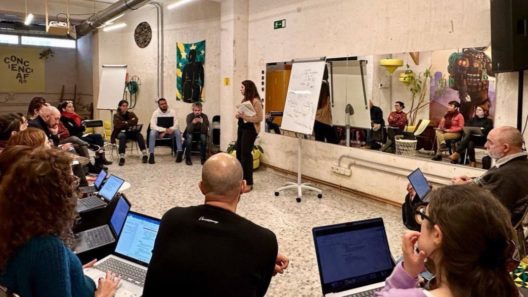How people could shape the future of AI in Kenya
Using public participation to develop AI governance and literacy
31 October 2024
Reading time: 11 minutes

The AI Readiness Index 2023 – which assesses a country’s AI readiness based on three key pillars: government preparedness, technology sector development, and data and infrastructure development – ranks sub-Saharan Africa as the lowest-scoring region across the world, and Kenya as 101st out of a total of 193 countries.
At the time of writing, there are only a few relevant policies that consider the social consequences of AI development and implementation in Africa. Rwanda, Mauritius and Egypt are the first countries in the continent to have national AI strategies. Mauritius, Egypt, Zambia, Tunisia and Botswana have established national AI programmes, and Nigeria just established the first African National Center for AI and Robotics to support research and development of new technologies and their applications in Nigerian national interests.[1]
Thirty-five countries in Africa have adopted data protection laws. Kenya, Tunisia, Zambia and Ghana have all made advances to build AI national strategies and policies, while others such as South Africa, Nigeria, Ghana and Kenya have passed data privacy legislation that might be used to regulate AI technology. Although the African Union Convention on Cyber Security and Personal Data Protection governs how personal data is handled by AI systems, the continent lacks a uniform international framework that offers guidance on AI ethics.
In Kenya, where this blog post will focus its attention, there is no formal foundation for AI, as the government has not yet created an AI plan and does not have a coherent legislative framework to implement it.
Kenya passed the Data Protection Act 2019, which protects data processed by AI systems, and the Computer Misuse and Cybercrimes Act 2018, which tackles attacks involving digital platforms and may apply to malicious AI use. However, this is still not enough to ensure AI and data work in the best interest of the public.
As in the case of other African countries that have only drafted AI strategies, Kenya’s policy framework is still in its early stages, leaving AI development and deployment essentially unregulated.
This is important because Kenya has simultaneously been experiencing two AI-related phenomena. The first is a surge in digital technology innovation, driven by increased internet penetration and mobile connectivity. This has contributed to the growth of a vibrant ecosystem of startups and government-led initiatives.
The second phenomenon is the use of online work platforms by international AI companies for data labelling, often in highly exploitative conditions. This has become a common source of informal employment for many of Kenya’s youth.
The unprecedented influence of data and AI on various aspects of people’s lives requires new and updated structures and norms. Meaningful public participation can enable young people, who make up most of the African population, and vulnerable communities to contribute to these new norms and influence decision-making on instances of development and use of data and AI.
Notably, public participation could contribute both to drafting strong AI legislation and policy frameworks and to shaping detailed AI policy that targets local contexts and is aligned with the needs of affected communities.
Efforts have been made to engage various Kenyan publics. These have taken the form of open data platforms, tech hubs and incubators, community-driven initiatives, policy dialogues and consultations. However, Kenya, and Africa in general, is yet to embrace inclusive public participation practices at scale. Indeed, the preconditions to meaningful participation, one of which is a solid AI legislative framework, are not in place.
The lack of explicit AI laws and regulations means that most decision-making aspects are delegated to a few private global players with the resources, expertise and data to create powerful AI models.[2] This, in turn, limits the powers of Kenyan political representatives and impedes inclusive and effective public engagement.
This blog post will argue that there are two necessary interventions to ensure that AI is deployed in ways that benefit Kenyan society: involving people in drafting legislation to enable genuine participation in policymaking throughout the AI supply chain, and achieving AI literacy.
Involving people in drafting AI legislation
The Kenyan government can draw on the mechanism of public participation to regulate AI in a way that reflects the social and cultural diversity that characterise the country.
The notion of involving the public in legislation is particularly interesting in Kenya, as the political ecosystem is already expected to include people’s voice in the deliberative process. The Kenyan Constitution recognises public participation as a democratic right and requires Parliament to facilitate public involvement in legislative and other business of the Assembly and its committees.
There have also been examples of public participation at the local level over the last two decades, with both benefits and shortcomings. For instance, local authorities in the Eastern and Costal regions of Kenya engaged their respective communities in selecting projects for capital investments via the Local Authority Service Delivery Action Plan. This model of top-down engagement in budget formulation was successful during the phase of project selection, although it failed during the one of project monitoring.
In principle, mechanisms of engagement should apply also to AI legislation: Parliament is expected to use public participation to legislate on AI development and use. Additionally, regulation could mandate public participation as part of decision-making on specific instances of AI use in the public and private sectors.
A greater diversity of voices is likely to result in more inclusive and robust policies. And early public participation guarantees that decision makers avoid preconceived positions on regulation.
The methods and means of public participation will differ from context to context and depend on the stage of AI system development and its application – from problem formulation to procurement processes (in the case of AI adoption for public government functions), to data collection, model selection and training, and continuous monitoring.
As in all public participation exercises, regardless of the decision-making stage, there should be clarity about the goals of participation, which the public should contribute to identifying and shaping, and the decisions that can be influenced by affected communities, advocates, domain experts and practitioners. In this, Kenyan county governments are best placed to work with local communities and include marginalised groups by selecting the appropriate participatory mechanism in each instance.
The public should also be able to play a role in defining the metrics and evaluate the outputs and outcomes of the engagement process according to those metrics. In this way, the implementing stakeholders will not only remain accountable to the people they serve but will also build trust with different communities and offer them targeted AI solutions.
Achieving widespread AI literacy
AI literacy is the second issue to address to enable public participation, which presupposes widespread and reliable technological access for people across all Kenyan regions.
AI literacy is an umbrella term that covers the skills and knowledge needed to use AI technologies, and also – importantly – to analyse and evaluate them. AI literacy training should cover technical skills alongside an understanding of the social implications of AI. Improving AI literacy gives people the skills they need to effectively participate and engage in using and critiquing these technologies, and how they impact on people and society. This, in turn, enables active public engagement in decision-making processes around regulation and implementation.
While the Kenyan government has instituted a centralised Digital Literacy Programme to teach digital skills, this is insufficient in relation to AI and understanding how its use may affect people in general and in their local context. And contextualising AI use to different geographical areas and cultural aspects of the country population will require a multistakeholder approach, encompassing public entities, civil society organisations, developers, researchers and local community subject experts.
Bridging the digital and AI-awareness divide among different segments of the population and across different parts of the country is essential to ensure people can discuss the development and use of AI in relation to their lives and experience and meaningfully participate to policymaking. This will require providing affordable and reliable internet connection as well as promoting AI educational initiatives, awareness campaigns and capacity-building programmes.
The Youth Café, a social enterprise focusing on Kenyan youth socio-economic and political empowerment, has engaged in public participation projects that address local contexts and are available in different regional languages and formats. Its AI-driven Youth Voter Education, a playbook for the use of AI in elections, focuses on young people’s AI literacy. The playbook teaches how to develop adaptive tools that can customise voter information material.
The project involves young people in data collection across various Kenyan counties. Survey questions have covered what young people would like to achieve with AI tools during electoral campaigns (such as countering disinformation, reaching remote areas of the country, promoting voter engagement); their concerns about AI use; and the measures they would like to see implemented to ensure adoption upholds human rights.
Building on the survey, the playbook helps address key issues such as low youth political participation. It engages people with youth-centred activities and aims at being inclusive and culturally sensitive. Moreover, it underscores the potentially positive role of technologies during elections, if used carefully and ethically.
In general, the Youth Café acknowledges the Kenyan youth’s desire to use AI in their day-to-day lives. AI tools can simplify their work schedules as well as improve decision-making in various social domains and develop products and services in different industries.
The Youth Café also recognises that genuine public participation in AI policy may not be quick nor easy, but foundational principles that are already successfully applied in other social domains, such as in curriculum development for primary school education, can already be transferred to the AI field. For instance, capacity building of affected communities is essential to enable them to participate as equal partners in decision-making processes. Providing technical advisers to different segments of the population through targeted programmes, the Youth Café contributes to increasing public understanding of AI and establishing engagement processes that can lead to better decisions.
The Youth Café also advises decision makers at different levels of government on how to involve the Kenyan population in AI policy.
Through the People Dialogue Festival event of 2024, the Youth Café held advocacy talks and discussions on public participation on legislative AI and data-related reforms with groups of Kenyan women and youth and elected and appointed officials, such as the majority leader in the National Assembly, Kimani Ichung’wah (Parliament representative for Kikuyu constituency) and representatives from the Independent Electoral and Boundaries Commission (IEBC).
AI governance in the interests of the people
For the public to meaningfully inform AI and data governance in Kenya, participation must be underpinned by preconditions that are not yet given.
If the country achieves a good degree of AI literacy, with culturally sensitive programmes, and both central and county governments involve Kenya’s various publics in the AI legislative process, this novel technology can be governed in the interest of people. And we can begin to establish frameworks that enable the public to participate in policies concerning all stages of AI development and use, from the decision to utilise an AI tool to real-world deployment and beyond.
The views expressed in this piece are of the author(s) and do not necessarily reflect those of the Ada Lovelace Institute.
Footnotes
[1] For context, AI platforms active in Africa include: Ubenwa, a Nigerian AI start-up that uses machine learning to monitor infant screams and detect indicators of birth asphyxia; Ada Health, a German-based AI start-up active in Ethiopia that offers a free AI-powered chatbot to diagnose symptoms and provide health advice; InstaDeep, a Tunisian AI start-up that provides cutting-edge AI solutions for a variety of domains such as logistics, gaming and energy.
[2] The material power of international AI corporations manifests itself in two ways: data representation and infrastructural control. In the absence of Kenyan AI companies, corporations such as IBM, Alphabet and Microsoft routinely import into the country AI products that are trained overseas and use data that does not represent the local communities. This divergence of data and representation is likely to lead to problematic applications and erroneous decisions, when AI software is used in decision-making processes. Additionally, the fact that predominantly North American private companies operate the Kenyan digital infrastructure exposes the country to several risks. Companies have the right to temporary shut down or block means of communication with an ‘off-switch’ mechanism, resulting in the spread of disinformation and possible interference. To give an example, on 25 June 2024, during the anti-Government protests that rocked several parts of the country, Safaricom, a leading telecommunication service provider in the country, shut down the internet network.
Related content

Community-informed governance: reflections for the AI sector
What can we learn from Chile’s street-led deliberations and the demand for constitutional reform?

Mobilising publics and grassroots organisations to impact AI policy
What can we learn from network-building initiatives in Spain?

Meaningful public participation and AI
Lessons and visions for the way forward